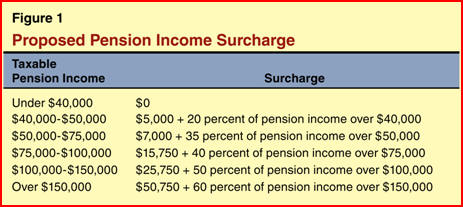March 25, 2010
Pursuant to Elections Code Section 9005, we have reviewed
the proposed initiative entitled the "McCauley Pension Recovery Act" (A.G. File
No. 10‑0014).
Background
The base of the
state's personal income tax consists of (1) all income earned by California
residents except for income attributable to activities in other states and
(2) income earned by residents of other states attributable to activities in
California. The state conforms to the federal treatment of pension income: the
portion attributable to employer contributions is taxable but the fraction
attributable to the taxpayer's own contributions is exempt.
Proposal
The measure establishes new taxes on pension income
beginning in 2012. Specifically, the measure creates:
-
A personal income tax surcharge on resident taxpayers
who receive more than $40,000 of "pension taxable income."
-
An excise tax on nonresidents or people who move out of
the state whose vested pension benefits from a California employer exceed
$40,000 per year.
Surcharge on Resident Pension Income
The proposal creates a new surcharge on pension taxable
income in excess of $40,000. Unlike the current definition of "taxable pension
income," pension taxable income includes all pension income whether attributable
to employer or taxpayer contributions, plus employer-paid health insurance
premiums. Pension income derived from employer contributions would also still be
taxable as it is under current law.
The surcharge would increase as the amount of pension
income increases, so that pension income above $150,000 would face a tax
surcharge of 60 percent. For example, a couple receiving pension income of
$160,000 with no other income and only the standard deduction would pay $9,637
in regular taxes (at the 9.3 percent top rate) and a surcharge of $56,750.
Taxpayers who were 75 or older on the date of enactment would receive a
nonrefundable annual credit of $10,500 against the surcharge. Figure 1 displays
the proposed surcharge schedule.

Excise Tax on Pensions of Nonresidents and Former Residents
The proposal imposes a one-time 50 percent excise tax on
the fair market value of "excess" vested pension benefits from California
employers that are received by nonresident taxpayers and by people who reside in
California on the date of enactment but later move out of the state. Excess
benefits are defined as the amount above $40,000 per year that the taxpayer's
vested pension benefits would provide on average over the individual's remaining
life expectancy as determined by the state Franchise Tax Board (FTB). The
taxpayer would be permitted to pay the excise tax as a lump sum or over time.
Taxpayers who were 75 or older on the date of enactment would receive a credit
of $250,000 against the excise tax.
Fiscal Effects
The initiative could result in $6 billion to $8 billion
in additional General Fund revenues each year beginning in 2012 assuming no
behavioral changes, but it would also likely induce behavioral changes that
would be significant and very hard to quantify. Consequently, we conclude the
measure could increase state revenues by several billion dollars annually. We
discuss the impact of the proposed income tax surcharge and the excise tax
separately below.
Income Tax Surcharge
The FTB estimates that the income tax surcharge would
generate roughly $5 billion per year. This assumes that the new tax does not
result in behavioral changes on the part of taxpayers or employers. Employers
would have a strong incentive to shift the mix of compensation toward wages and
salaries and away from pension benefits. Similarly, the measure would encourage
workers to retire or leave the state as soon as the estimated value of their
vested benefits (including employer-paid health insurance) approached $40,000
per year. As no state has ever imposed a tax on pensions at a rate even close to
the rate proposed in this measure, no data are available to estimate the
behavior changes that would result from such a policy.
Excise Tax on Nonresidents and Movers
The FTB estimates that the excise tax would generate
annual revenue in the range of $1 billion to $3 billion, again assuming no
behavioral changes designed to reduce tax liability. This estimate should be
interpreted with caution, as data on the life expectancy of people with vested
pensions who leave the state were not available. Also, taxpayers would have an
incentive to leave the state before the date of enactment to avoid being counted
as a resident of the state on that date.
Potential Legal Problems of the Excise Tax.
The measure raises legal issues that may result in the excise tax being
invalidated under federal law. According to FTB, states are prohibited from
imposing an income tax on the retirement income (from an in-state employer) of a
nonresident. While the proposed excise tax is not technically a tax on current
income, the outcome is similar especially since this measure allows the excise
tax to be paid over time. As a result, the excise tax may not survive a legal
challenge.
If a court were to
strike down the excise tax, taxpayers subject to the surcharge would have an
incentive to leave and would avoid any additional payments. Large-scale
outmigration of retirees (who are no longer tied to the state by their jobs)
could result, which would in turn induce job losses in health care and other
sectors that support retirees. It is conceivable that revenue losses from such a
reduction in the state's economic base could outweigh gains from the surcharge,
causing a reduction in overall revenue.
Summary of Fiscal Effect
The measure would have the following major fiscal effect:
Return to Propositions
Return to Legislative Analyst's Office Home Page